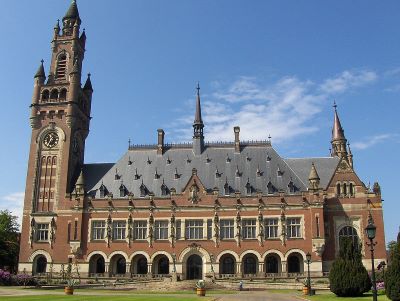Context-
In today's increasingly polarized world, marked by persistent armed conflicts like the Russia-Ukraine dispute and the Israel-Palestine tensions, international law plays a crucial role in shaping global responses. Amidst these challenges, the International Court of Justice (ICJ) stands out as a pivotal institution, tasked with adjudicating disputes between nations and interpreting international law. Despite its limitations in enforcement, the ICJ's recent judgments in significant cases have highlighted its potential impact on global perceptions and policies.
|
What is ICJ? ● The International Court of Justice (ICJ) was established in 1945 as part of the United Nations framework and began its operations in April 1946. ● It is the principal judicial organ of the United Nations and is headquartered at the Peace Palace in The Hague, Netherlands, setting it apart from the other six main UN organs located in New York, USA. ● The ICJ's primary functions include resolving legal disputes between States and offering advisory opinions on legal matters based on international law. It receives referrals for advisory opinions from authorized UN bodies and specialized agencies. ● Currently, the ICJ has 193 state parties, reflecting widespread international recognition and engagement with its jurisdiction. The International Court of Justice (ICJ) functions as a global court with a dual jurisdiction: Resolving Legal Disputes: ● The ICJ adjudicates legal disputes brought before it by States in contentious cases, such as settling disputes between countries and determining "state responsibility" for violations of international law. ● Only UN member States that have ratified the Statute of the Court or accepted its jurisdiction under specific conditions are parties to contentious cases. Providing Advisory Opinions: ● The ICJ provides advisory opinions on legal questions referred to it by authorized United Nations organs and specialized agencies. |
Ukraine-Russia Conflict: A Unique Genocide Case
The Ukraine-Russia conflict, ongoing since 2022, has presented complex legal challenges for the ICJ, particularly concerning allegations of genocide. It highlights the unconventional nature of this case, where Ukraine accuses Russia of falsely claiming genocide to justify aggression. This reverse scenario raises jurisdictional and procedural questions within the framework of the Genocide Convention.
The ICJ's involvement commenced with Ukraine's suit against Russia following the 2022 invasion. Despite the Court's order for Russia to suspend military operations, Russia's non-compliance underscores the limitations of the ICJ's authority in enforcing its rulings.
In February 2024, the ICJ ruled on preliminary objections raised by Russia, affirming that using force based on false genocide allegations does not fall under the Genocide Convention's scope. This ruling exemplifies the legal intricacies faced by the ICJ when navigating conflicts intertwined with allegations of genocide and aggression.
Moreover, the Ukraine-Russia case highlights broader challenges in enforcing international law amid ongoing conflicts. The ICJ's role as a judicial body relies heavily on state compliance, revealing the complex interplay between legal frameworks and geopolitical realities.
South Africa-Israel Dispute: Genocide Allegations in Gaza
The ICJ's involvement in the South Africa-Israel dispute sheds light on the complexities of addressing alleged Genocide Convention violations in contemporary conflicts. South Africa's suit against Israel for alleged genocide obligations in Gaza underscores the convention's applicability across state boundaries.
The ICJ's ruling acknowledged a plausible "genocide-like" situation in Gaza and recognized the Palestinian people as a distinct national group, pivotal for proving genocide. However, the Court's decision not to order a ceasefire and to decline fact-finding access to Gaza reflects the limitations of ICJ rulings in influencing conflict dynamics.
This case underscores the broader challenges in translating legal judgments into tangible outcomes during ongoing conflicts. The ICJ's role in adjudicating complex disputes requires navigating intricate legal and political landscapes, often necessitating collaboration with international bodies for effective enforcement.
The Role and Impact of ICJ Decisions
Beyond specific cases, it underscores the broader role and impact of ICJ decisions in shaping global perceptions and state policies. The ICJ's advisory opinion on the Israeli-West Bank barrier in 2004 serves as a notable example, contributing to international condemnation and altering discourse on the Israeli-Palestinian conflict.
Despite lacking direct enforcement mechanisms, ICJ decisions exert decentralized impacts by influencing state behavior and global narratives. The author emphasizes the nuanced role of international law in maintaining order amid geopolitical complexities, acknowledging its imperfections while recognizing its indispensable role in addressing contemporary challenges.
The ICJ's jurisdiction extends beyond individual cases, shaping evolving legal norms and influencing international relations. However, the ICJ's efficacy hinges on broader institutional frameworks, emphasizing the interconnectedness of legal processes and geopolitical realities in addressing global conflicts.
Conclusion
In conclusion, it underscores the evolving role of the ICJ in addressing complex global conflicts and the challenges faced in applying international law effectively. While ICJ decisions can shape perceptions and influence state behavior, their impact remains contingent on broader geopolitical realities and the willingness of states to comply with international legal norms. It calls for a nuanced understanding of the role of international law in maintaining global order and cooperation, acknowledging its imperfections while recognizing its indispensable role in addressing contemporary challenges.
|
Probable Questions for UPSC Mains Exam- 1. How does the International Court of Justice (ICJ) navigate the challenges of adjudicating disputes intertwined with allegations of genocide, as exemplified in the Ukraine-Russia conflict? (10 Marks, 150 Words) 2. What are the limitations and implications of the ICJ's role in addressing alleged Genocide Convention violations, as highlighted in the South Africa-Israel dispute concerning Gaza? (15 Marks, 250 Words) |
Source- ORF







